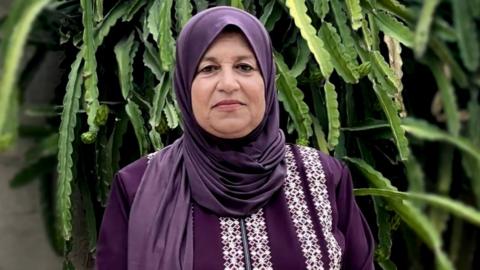After being gathered by hand, villagers from Umm Safa take sacks full of olives to the nearby factory, where the presses have restarted this season.
Olives are the most important agricultural product in the West Bank. In a good year, they're worth more than $70m (£54m) to the Palestinian economy.
But income was well down last year and this year will be even worse, says factory owner Abd al-Rahman Khalifa, as even fewer farmers are able to harvest their crop owing to attacks by settlers.
“Let me give you an example,” he tells me.
“My brother-in-law in Lubban - next to the Israeli settlement - went to pick his own olives, but they broke his arms and they made him leave along with everyone who was with him.”
“We, as Palestinians, don’t have petrol or big companies. Our main agricultural crop is olives,” he adds. “So, like the Gulf depends on oil, and the Americans on business, our economy is dependent on the olive tree.”
On the hill overlooking the olive groves of Umm Safa stands an illegal settler outpost - a farm.
The extremist settler who runs it, Zvi Bar Yosef, was sanctioned this year by the UK and other Western governments for repeated acts of violence against Palestinians, including twice threatening families at gunpoint.
Over the last year of the war in Gaza, Jewish settlers have been emboldened by the support of far-right Israeli ministers like Itamar Ben-Gvir.
As national security minister, he has given out free firearms to hundreds of settlers and has encouraged them to assert their right to what - they say - is their "God-given" land.
Ben-Gvir has also been accused of openly supporting the disruption of olive harvesting on Palestinian land.
At the olive press, farmers wait patiently in the yard to witness the transformation of the olives they’ve been able to gather this year into "liquid gold".
The olive tree has been a symbol of this land for centuries.
For generations of Palestinians, it is their link to the land - a link that is under threat now more than ever.
